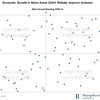By Emily Badger
In the economic analysis the Brookings Institution released last week — the one where Washington looks remarkably bad — Austin, Raleigh and Nashville are all humming. Their economies are growing. Aggregate wages are rising. The number of jobs in these regions is expanding, too.
That’s all great news if you believe that a rising tide lifts all boats. Except, in these places, it hasn’t. Whatever economic growth these metropolitan areas have experienced since the recession isn’t improving the quality of life for everyone.
Take Austin: Among the 100 largest metropolitan areas in the country, it ranks 2nd in the nation on Brookings’ combined measure of economic growth. On “inclusion” — which reflects improvements in relative poverty, median wages and employment — it ranks 60th. Austin fares barely better when you consider those metrics particularly among non-whites.
Look across all 100 of these metros, and there’s only a weak relationship between economic growth and inclusion. Areas with rapid growth haven’t necessarily swept up the poor and working class. In many places where relative poverty has declined (like Jackson, Miss.), the economy isn’t growing much:
This non-pattern is notable precisely because the rising-tide theory remains so alluring, particularly among Republicans. Grow the economy, they argue, and that will improve job prospects and living standards for everyone — the poor, the working class, minorities and other groups that have been left behind. Economic growth, they add, will achieve far more than any targeted program or government spending.
“The best anti-poverty program is economic growth,” Paul Ryan declared in the Wall Street Journal two years ago, as he was beginning to roll out his own poverty agenda.
“Economic growth is the key to everything,” offered Ohio Gov. John Kasich.
Here’s Jeb Bush’s take, in arguing that 4 percent growth will create jobs enough for everyone: “So many challenges could be overcome if we just get this economy growing at full strength.”
Rand Paul insists that this logic will specifically lift up African Americans, who should reconsider “the Republican promise” for policies that boost economic growth.
The data that we have, though, shows that inclusion doesn’t work on autopilot. Sometimes — often — economic growth happens without broad benefits. And that means we have to actually be intentional in bringing everyone along, in connecting poor communities to transportation, or unemployed men to job training, or minority children to better education.
“Our study suggests that growth and prosperity alone are not enough to improve outcomes in inclusion,” says Chad Shearer, a senior research analyst at Brookings and one of the authors of the analysis. “That’s especially poignant in D.C., which has one of the highest median incomes and median wages — but also the highest disparities between whites and people of color.”
















